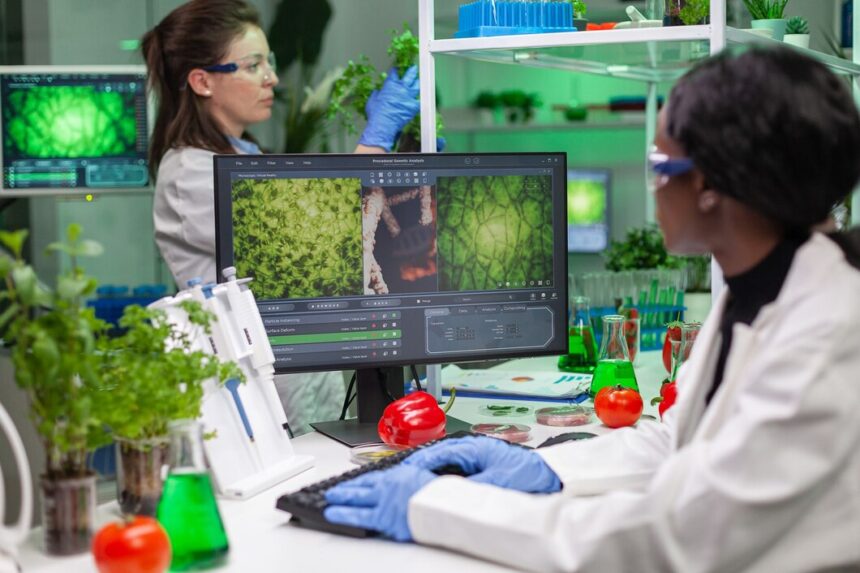South African agriculture, a sector integral to both the nation’s economy and food security, faces various challenges ranging from climate change to pests, diseases, and the need for higher crop yields. Traditional breeding methods and chemical interventions have played vital roles in addressing these issues, but the rapidly advancing field of gene editing, particularly CRISPR technology, is revolutionizing the agricultural landscape. CRISPR (Clustered Regularly Interspaced Short Palindromic Repeats) is a gene-editing tool that allows for precise modifications of an organism’s DNA, offering South African farmers unprecedented opportunities to enhance productivity, resilience, and sustainability.
Understanding CRISPR and Its Potential
CRISPR technology, derived from a natural defense mechanism in bacteria, enables scientists to edit genes with high precision. It works like a molecular “scissors” that can cut and modify specific sequences in the genetic code. This allows for changes in crops and livestock at the genetic level, which can introduce desirable traits without the need for traditional crossbreeding or the insertion of foreign genes.
Unlike earlier genetic modification technologies, CRISPR offers a more straightforward, efficient, and less costly way to edit genes. As a result, it is increasingly seen as a game-changer for agricultural innovation, with significant potential for improving crop and livestock varieties, enhancing disease resistance, and tackling the challenges of food security and climate change.
Enhancing Crop Yields and Resilience
For South African farmers, CRISPR offers a powerful tool to address one of their biggest challenges—climate change. Extreme weather patterns, droughts, and rising temperatures have made it difficult for traditional crops to thrive. CRISPR can help develop crops that are more drought-tolerant, heat-resistant, and able to withstand unpredictable weather conditions. For instance, scientists are using CRISPR to edit the DNA of maize and wheat to improve their resistance to drought, which is critical in areas where water resources are scarce.
By modifying the genes of crops to enhance their ability to survive in harsh conditions, farmers can achieve higher yields and reduce the risk of crop failure. This is particularly important in regions like South Africa, where unpredictable weather patterns can significantly impact agricultural productivity. Additionally, CRISPR has the potential to improve the nutritional content of staple crops, such as enhancing the vitamin A content in maize, an important measure for combating malnutrition.
Combating Pests and Diseases
Pests and diseases are constant threats to South African agriculture, causing crop losses and threatening food security. Invasive species, such as the fall armyworm, have wreaked havoc on crops like maize, while diseases like the wheat rust fungus have led to substantial yield losses.
CRISPR is being used to create genetically modified crops with built-in resistance to specific pests and diseases. For example, researchers are working on developing pest-resistant varieties of maize by editing genes that make plants less susceptible to attacks from pests. CRISPR could also be used to make crops resistant to fungal infections or bacterial diseases, significantly reducing the need for harmful chemical pesticides.
These advancements not only increase productivity but also help reduce the environmental impact of agriculture. By decreasing the reliance on chemical treatments, CRISPR-edited crops could lead to a more sustainable and environmentally friendly farming system.
Improving Livestock Breeding
The application of CRISPR in livestock breeding is another area where South Africa stands to benefit. Livestock farming, particularly cattle, poultry, and pigs, is a key part of the agricultural sector. CRISPR allows for faster, more efficient breeding programs by enabling the precise editing of genes that control desirable traits like disease resistance, improved meat quality, and increased milk production.
For example, CRISPR has been used to enhance the resistance of livestock to diseases like tuberculosis, which is a significant concern in South Africa’s cattle industry. The technology can also be used to edit genes associated with growth rates, helping farmers produce more efficient, faster-growing animals.
Furthermore, CRISPR can help reduce the environmental footprint of livestock farming by enabling the breeding of animals that require less feed or produce less methane, a potent greenhouse gas. This could make South Africa’s livestock sector more sustainable and aligned with global efforts to reduce carbon emissions.
Regulatory and Ethical Considerations
While the potential benefits of CRISPR in South African agriculture are immense, the technology raises regulatory and ethical questions. The South African government has taken steps to regulate gene editing and ensure its safe application in agriculture. In 2019, the South African government issued guidelines for the regulation of gene-edited crops, making it one of the first countries to create a clear legal framework for gene-edited organisms.
However, there are still concerns about the long-term impacts of gene editing on biodiversity and the environment. Some critics argue that the widespread adoption of genetically edited crops and livestock could lead to unintended ecological consequences. Others express concerns over the ethical implications of modifying organisms at the genetic level.
It is crucial that South Africa continues to engage in rigorous scientific research and public dialogue to ensure that CRISPR technology is used responsibly and with consideration for its potential risks.
Looking Forward: The Future of CRISPR in South African Agriculture
CRISPR technology has the potential to revolutionize South African agriculture by enabling more sustainable, resilient, and productive farming systems. As the technology continues to evolve, it could help South African farmers tackle the challenges of climate change, pests, diseases, and food security in innovative ways. While regulatory and ethical considerations must be carefully addressed, the promise of CRISPR in transforming agriculture is undeniable.
With ongoing research, collaboration between scientists, farmers, and policymakers, and responsible regulation, CRISPR could play a pivotal role in shaping the future of South African agriculture, ensuring a more secure and sustainable food system for generations to come.
Join 'Farmers Mag' WhatsApp Channel
Get the latest Farming news and tips delivered straight to your WhatsApp
CLICK HERE TO JOIN






